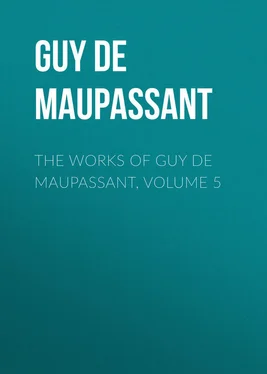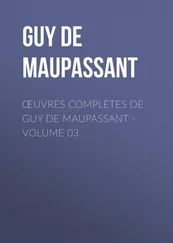Guy Maupassant - The works of Guy de Maupassant, Volume 5
Здесь есть возможность читать онлайн «Guy Maupassant - The works of Guy de Maupassant, Volume 5» — ознакомительный отрывок электронной книги совершенно бесплатно, а после прочтения отрывка купить полную версию. В некоторых случаях можно слушать аудио, скачать через торрент в формате fb2 и присутствует краткое содержание. Жанр: literature_19, foreign_antique, foreign_prose, на английском языке. Описание произведения, (предисловие) а так же отзывы посетителей доступны на портале библиотеки ЛибКат.
- Название:The works of Guy de Maupassant, Volume 5
- Автор:
- Жанр:
- Год:неизвестен
- ISBN:нет данных
- Рейтинг книги:3 / 5. Голосов: 1
-
Избранное:Добавить в избранное
- Отзывы:
-
Ваша оценка:
- 60
- 1
- 2
- 3
- 4
- 5
The works of Guy de Maupassant, Volume 5: краткое содержание, описание и аннотация
Предлагаем к чтению аннотацию, описание, краткое содержание или предисловие (зависит от того, что написал сам автор книги «The works of Guy de Maupassant, Volume 5»). Если вы не нашли необходимую информацию о книге — напишите в комментариях, мы постараемся отыскать её.
The works of Guy de Maupassant, Volume 5 — читать онлайн ознакомительный отрывок
Ниже представлен текст книги, разбитый по страницам. Система сохранения места последней прочитанной страницы, позволяет с удобством читать онлайн бесплатно книгу «The works of Guy de Maupassant, Volume 5», без необходимости каждый раз заново искать на чём Вы остановились. Поставьте закладку, и сможете в любой момент перейти на страницу, на которой закончили чтение.
Интервал:
Закладка:
Sometimes when the baroness was speaking of the far-away time of her childhood she would say to fix a date: "It was about the time of Lison's mad attempt." She never said anything more, and there was a certain mystery about this "mad attempt."
One evening, when she was about nineteen years old, Lise had tried to drown herself. No one could understand the reason of this act of folly; there was nothing in her life or habits to at all account for it. She had been rescued half-dead, and her parents, shocked at the deed, had not attempted to discover its cause, but had only talked about her "mad attempt," in the same way as they had spoken of the accident to the horse Coco, when he had broken his leg in a ditch and had to be killed. Since then Lise had been thought very weak-minded, and everyone around her gradually came to look upon her with the mild contempt with which her relations regarded her; even little Jeanne, perceiving with the quickness of a child how her parents treated her aunt, never ran to kiss her or thought of performing any little services for her. No one ever went to her room, and Rosalie, the maid, alone seemed to know where it was situated. If anyone wanted to speak to her a servant was sent to find her, and if she could not be found no one troubled about her, no one thought of her, no one would ever have dreamt of saying:
"Dear me! I have not seen Lison this morning."
When she came down to breakfast of a morning, little Jeanne went and held up her face for a kiss, and that was the only greeting she received. She had no position in the house and seemed destined never to be understood even by her relations, never able to gain their love or confidence, and when she died she would leave no empty chair, no sense of loss behind her.
When anyone said "Aunt Lison" the words caused no more feeling of affection in anyone's heart than if the coffee pot or sugar basin had been mentioned. She always walked with little, quick, noiseless steps, never making any noise, never stumbling against anything, and her hands seemed to be made of velvet, so light and delicate was their handling of anything she touched.
Lison arrived at the château about the middle of July, quite upset by the idea of the marriage; she brought a great many presents which did not receive much attention as she was the giver, and the day after her arrival no one noticed she was there. She could not take her eyes off the sweethearts, and busied herself about the trousseau with a strange energy, a feverish excitement, working in her room, where no one came to see her, like a common seamstress. She was always showing the baroness some handkerchiefs she had hemmed, or some towels on which she had embroidered the monogram, and asking:
"Do you like that, Adélaïde?"
The baroness would carelessly look at the work and answer:
"Don't take so much trouble over it, my dear Lison."
About the end of the month, after a day of sultry heat, the moon rose in one of those warm, clear nights which seem to draw forth all the hidden poetry of the soul. The soft breeze fluttered the hangings of the quiet drawing-room, and the shaded lamp cast a ring of soft light on the table where the baroness and her husband were playing cards. Aunt Lison was sitting by them knitting, and the young people were leaning against the open window, looking out at the garden as it lay bathed in light.
The shadows of the linden and the plane tree fell on the moonlit grass which stretched away to the shadows of the wood.
Irresistibly attracted by the beauty of the sight, Jeanne turned and said:
"Papa, we are going for a walk on the grass."
"Very well, my dear," answered the baron, without looking up from his game.
Jeanne and the vicomte went out and walked slowly down the grass till they reached the little wood at the bottom. They stayed out so long that at last the baroness, feeling tired and wanting to go to her room, said:
"We must call in the lovers."
The baron glanced at the moonlit garden, where the two figures could be seen walking slowly about.
"Leave them alone," he answered, "it is so pleasant out of doors; Lison will wait up for them; won't you, Lison?"
The old maid looked up, and answered in her timid voice: "Oh, yes, certainly."
The baron helped his wife to rise, and, tired himself by the heat of the day,
"I will go to bed, too," he said. And he went upstairs with the baroness.
Then Aunt Lison got up, and, leaving her work on the arm of the easy chair, leant out of the window and looked at the glorious night. The two sweethearts were walking backwards and forwards across the grass, silently pressing each other's hands, as they felt the sweet influence of the visible poetry that surrounded them.
Jeanne saw the old maid's profile in the window, with the lighted lamp behind.
"Look," she said, "Aunt Lison is watching us."
"Yes, so she is," answered the vicomte in the tone of one who speaks without thinking of what he is saying; and they continued their slow walk and their dreams of love. But the dew was falling, and they began to feel chilled.
"We had better go in now," said Jeanne.
They went into the drawing-room, and found Aunt Lison bending over the knitting she had taken up again; her thin fingers were trembling as if they were very tired. Jeanne went up to her.
"Aunt, we will go to bed now," she said.
The old maid raised her eyes; they were red as if she had been crying, but neither of the lovers noticed it. Suddenly the young man saw that Jeanne's thin slippers were quite wet, and fearing she would catch cold:
"Are not your dear little feet cold?" he asked affectionately.
Aunt Lison's fingers trembled so they could no longer hold the work; her ball of wool rolled across the floor, and, hiding her face in her hands, she began to sob convulsively. For a moment Jeanne and the vicomte stood looking at her in mute surprise, then Jeanne, feeling frightened, knelt down beside her, drew away her hands from her face, and asked in dismay:
"What is it, Aunt Lison? What is the matter with you?"
The poor, old maid, trembling all over, stammered out in a broken voice:
"When he asked you – 'Are – are not your dear little feet – cold?' – I – I thought how no one had – had ever said anything like that to me."
Jeanne felt full of pity for her aunt, but it seemed very funny to think of anyone making love to Lison, and the vicomte turned his head away to hide his laughter. Lison started up, left her wool on the ground and her knitting on the armchair, and abruptly leaving the room, groped her way up the dark staircase to her bedroom.
The two young people looked at one another, feeling sorry for her, and yet rather amused.
"Poor auntie," murmured Jeanne.
"She must be a little mad this evening," replied Julien.
They were holding each other's hands as if they could not make up their minds to say good-night, and very gently they exchanged their first kiss before Aunt Lison's empty chair. The next day they had forgotten all about the old maid's tears.
The fortnight before her marriage, Jeanne passed calmly and peacefully, as if she were almost exhausted by the number of pleasant hours she had lately had. The morning of the eventful day she had no time to think; she was only conscious of a great sense of nothingness within her, as if beneath her skin, her flesh, and blood, and bones had vanished, and she noticed how her fingers trembled when she touched anything.
She did not regain her self-possession till she was going through the marriage service. Married! She was married! Everything which had happened since dawn seemed a dream, and all around her seemed changed; people's gestures had a new meaning; even the hours of the day did not seem to be in their right places. She felt stunned at the change. The day before nothing had been altered in her life; her dearest hope had only become nearer – almost within her grasp. She had fallen asleep a girl, now she was a woman. She had crossed the barrier which hides the future with all its expected joys and fancied happiness, and she saw before her an open door; she was at last going to realize her dreams.
Читать дальшеИнтервал:
Закладка:
Похожие книги на «The works of Guy de Maupassant, Volume 5»
Представляем Вашему вниманию похожие книги на «The works of Guy de Maupassant, Volume 5» списком для выбора. Мы отобрали схожую по названию и смыслу литературу в надежде предоставить читателям больше вариантов отыскать новые, интересные, ещё непрочитанные произведения.
Обсуждение, отзывы о книге «The works of Guy de Maupassant, Volume 5» и просто собственные мнения читателей. Оставьте ваши комментарии, напишите, что Вы думаете о произведении, его смысле или главных героях. Укажите что конкретно понравилось, а что нет, и почему Вы так считаете.












